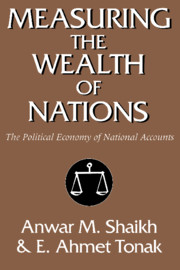Book contents
- Frontmatter
- Contents
- List of figures
- List of tables
- Preface
- 1 Introduction
- 2 Basic theoretical foundations
- 3 Marxian categories and national accounts: Money value flows
- 4 Marxian categories and national accounts: Labor value calculations
- 5 Empirical estimates of Marxian categories
- 6 A critical analysis of previous empirical studies
- 7 Summary and conclusions
- Appendices
- References
- Author index
- Subject index
1 - Introduction
Published online by Cambridge University Press: 09 February 2010
- Frontmatter
- Contents
- List of figures
- List of tables
- Preface
- 1 Introduction
- 2 Basic theoretical foundations
- 3 Marxian categories and national accounts: Money value flows
- 4 Marxian categories and national accounts: Labor value calculations
- 5 Empirical estimates of Marxian categories
- 6 A critical analysis of previous empirical studies
- 7 Summary and conclusions
- Appendices
- References
- Author index
- Subject index
Summary
Approaches to the measurement of national product
This book aims to provide an alternate foundation for the measurement of the production of nations. The framework developed here is applied to the U.S. economy for the postwar period. The patterns that result are significantly different from those derived within conventional systems of national accounts.
National accounts give systematic empirical form to the structure, patterns, and performance of an economy (Young and Tice 1985). In the modern world, they provide the objective basis for judging the level and progress of the wealth of nations and for identifying the causes of success and failure.
Conventional systems of national accounts include the United Nations System of National Accounts, the United States National Income and Product Accounts, and various forms of input–output accounts. It is our contention that these types of accounts seriously distort the levels and trends of the national product, the surplus product, productivity, and other major aggregate economic variables. Because measurement and analysis are inextricably intertwined, our understanding of intertemporal and international economic development is correspondingly affected.
Criticisms of official national accounts are not new. Debates about their purpose and structure have gone on from the very start (Eisner 1988, p. 1611). In recent times, there has been a renewed flurry of questions about their adequacy. Such criticisms come from a variety of quarters, ranging from official agencies such as the United Nations to a variety of prestigious economists.
- Type
- Chapter
- Information
- Measuring the Wealth of NationsThe Political Economy of National Accounts, pp. 1 - 19Publisher: Cambridge University PressPrint publication year: 1994

